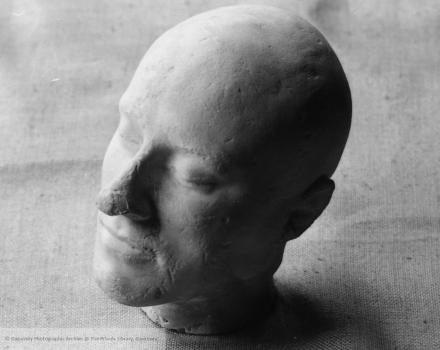30th March 2022
From Report relating to frauds in the Customs, 1733, Appendix, pp. 634-5.
13th March 2019
Execution of M J F Béasse, For the Crime of Infanticide. A handbill from 1830 in the Library collection, a gruesome souvenir of the notorious crime committed by a young French nobleman in the vicinty of Guernsey's Ruettes Brayes, translated from the original French.
8th March 2019

‘Tu ne tueras pas.’ Pas d’exception. ‘Thou shalt not kill.’ No exceptions. [Victor Hugo, 19 Feb. 1854, Marine Terrace, Jersey]. This death mask was kept by Victor Hugo in the Billiard Room in Hauteville House along with his famous drawing of Tapner, 'Le Pendu,' or 'The Hanged Man.' The Billiard Room was also home to portraits of the Hugo family, other favourite drawings, and maps of meaningful places in Hugo's life. The importance of these memoirs of Tapner to Hugo is thus obvious: they were a permanent reminder of the cruelty of man to man, and of his (for him) abject failure to save Tapner from the scaffold. In addition Hugo blamed himself for Tapner's execution, believing that his ardent intervention had actually been counter-productive - that the French government had pressed upon their British allies not to give in to Hugo's wishes, and that the British had complied. This striking photograph of the mask is by the late Guernsey photographer Carel Toms, taken in 1975, and is part of the Guernsey Photographic Archive held at the Priaulx Library.
19th January 2017
Daniel Girard, Castle Porter, that is, prison warden/jailkeeper, lost his prisoner, George Pellew, who had been committed to his care by Jean Dobrée. Pellew owed Dobrée money. The Royal Court, under the auspices of the Juge-Délegué, William Le Marchant, had ruled on 8 March 1719 that Daniel Girard should not be required in any way to compensate Dobrée. Dobrée appealed to the Privy Council, who requested a report on precedents to the Royal Court. The following letter is what the Royal Court produced in reply; on reading it, the Privy Councillors confirmed the Royal Court's initial judgment and dismissed the appeal.
14th January 2016
Two similar and unpleasant cases from the first half of the 14th century, one in the time of Edward I, the second under Edward II. Original documents in Latin. The illustration is of a French girl of the period, from Mercuri and Bonnard's Costumes Historiques des XIIe-XVe siècles, Paris: A Lévy fils, 1860, I, p. 78, in the Library Collection.
6th January 2016
In Guernsey the authorities could, if they wished, make use of the jehennet, or 'Jenny,' better known as ... the rack. It appears, however, that they preferred strappado. The illustration is from Fox's Book of Martyrs, revised John Malham: London, Thomas Kelly, 1814, in the Library Collection.
31st July 2015
The good citizens of St Martin's are asked to give evidence in this tragic case. Transcribed in the original French by Edith Carey into her notebook, Jehanne Becquet's trial for child murder, with her annotations, it is translated here into modern English. From Sir E MacCulloch's MSS. Livre ès Crimes I 60. Jehanne would have known that it was essential for her to show her baby to witnesses, even if it had been stillborn, but she was unable or unwilling to do so. Make your own mind up about her. Do you agree with the court's verdict?
22nd May 2015
28 May 1753 Nicolas Lawrence, probably Nicolas Laurens [Old Bailey].
14th April 2015
The Library has a complete set of the Calendars of Patent Rolls, except for the years 1248-1280, (this volume can be accessed online.) Those below, of the last quarter of the 13th century, refer to the activities of the infamous Otto de Grandison, amongst other things.
'His case is but one out of many that might be adduced, to prove the wisdom of intrusting the punishment of offences, in a small community like ours, to the discretion of the judges rather than to the precise letter of an unyielding statute law.' From The Star, February 3rd 1834.